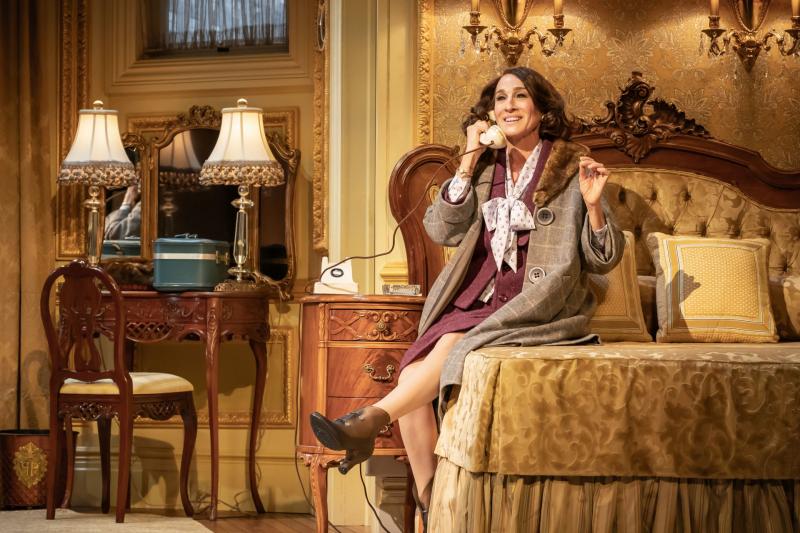Plaza Suite, Savoy Theatre review - real-life married couple brings panache and pain to period comedy | reviews, news & interviews
Plaza Suite, Savoy Theatre review - real-life married couple brings panache and pain to period comedy
Plaza Suite, Savoy Theatre review - real-life married couple brings panache and pain to period comedy
Neil Simon's 1968 play allows for fun, yes, but also sadness

Sarah Jessica Parker's screen renown as Carrie Bradshaw in Sex and the City has made a London event out of the West End revival of Plaza Suite, the Neil Simon triptych from 1968 that is as definably New York as the TV series in which Parker made her name. But for all that Simon has over the years been dismissed in London as overly frothy and glib, this current production reminds us that his landscape was no less alive to melancholy, even pain.
That awareness lends a sense of discovery to the director John Benjamin Hickey's surprisingly affecting production, seen several years ago on Broadway and now transferred to that rare West End theatre, the Savoy, that very aptly comes with a hotel attached. Let's hope the Savoy's current denizens are rather happier or more fulfilled than the three very different pairings on view in Simon's play, which more than once put me in mind of the Sondheim musical Company, premiered on Broadway two years later, and not just because Simon anticipates his near-contemporary by making telling use of a vodka stinger.  The setting is room 719 of the Plaza Hotel, that Manhattan landmark adjacent to Central Park that was a visual mainstay of my childhood as a New Yorker, just as "Doc" Simon's plays, to allow the author his showbiz nickname, were essential aspects of my own theatrical coming-of-age. Indeed, it comes as rather a jolt to think that Matthew Broderick, Parker's husband and the show's other name draw, won his first of two Tony Awards for Simon's Brighton Beach Memoirs over 40 years ago, and has been returning to the stage regularly ever since. (Indeed, he was seen in London to negligible effect just four years ago, opposite Elizabeth McGovern, in his chum Kenneth Lonergan's The Starry Messenger.)
The setting is room 719 of the Plaza Hotel, that Manhattan landmark adjacent to Central Park that was a visual mainstay of my childhood as a New Yorker, just as "Doc" Simon's plays, to allow the author his showbiz nickname, were essential aspects of my own theatrical coming-of-age. Indeed, it comes as rather a jolt to think that Matthew Broderick, Parker's husband and the show's other name draw, won his first of two Tony Awards for Simon's Brighton Beach Memoirs over 40 years ago, and has been returning to the stage regularly ever since. (Indeed, he was seen in London to negligible effect just four years ago, opposite Elizabeth McGovern, in his chum Kenneth Lonergan's The Starry Messenger.)
This show is a better fit for Broderick's now-signature affectlessness on stage, and the two playlets seen post-interval make physical demands that he meets with aplomb. But it's Parker, a stage actress as a child long since siphoned off primarily to the screen, who really impresses here and who, one assumes, justifies ticket prices heading towards £400: that said, news of the play's extension into April was quick to report cheaper tickets on offer, as well, lest the headlines be about the spiralling cost of playgoing and not the starry talent.
I confess to not being prepared for the range Parker displays here, and her gift for walking a tightrope between wise-cracking wit and wistfulness that at times really did put me in mind of Chekhov, the master whom Simon admired and upon whom he deliberately modelled his own 1973 play, The Good Doctor. She's in tremendous form in the piece that makes up the first half – "Visitor from Mamaroneck" – in which she plays Karen, an excitable wife approaching 50 who has arrived early at the suite so as to prepare for a giddy anniversary celebration with her husband, Sam (Broderick).
Things of course don't go to plan, and not only because Karen turns out to be somewhat vague as to the details of her age, the number of years she's been married, and whether she's actually got the same hotel room in which she and Sam had such a happy time some years before. Shot through with zingers about a marriage gone south and intimations of mortality that sting, the writing has a robustness that is fully delivered by these headliners, and Parker manages to make anchovies as crucial to this scenario as, say, sardines are to Noises Off.
The second piece is the slightest and in some ways the weirdest. "Visitor from Hollywood" finds Broderick dressed in eyepopping plaid as an Austin Powers-esque Hollywood producer called Jesse Kiplinger who clearly doesn't think much of women – his various wives, he reports, were "three of the worst bitches", an assessment that seems not to sway Parker's headband-wearing, self-doubting Muriel. Leggy and alive with self-doubt, she has arrived at the suite on the chance that they might rekindle the magic that the two shared 17 years ago, before Jesse hit the bigtime.
Fame here is the aphrodisiac in a way that is cunningly mirrored by this production itself, and it's fascinating to hear the roll call of talent that turns this pair on. Jesse lives in Humphrey Bogart's former home and hangs with a readily enumerated A-list, though one wonders whether Yvette Mimieux will carry much currency these days: Liza Minnelli presumably still does.
The final sketch, "Visitor from Forest Hills", furthers the connection to Company by focusing on the daughter, Mimsey (Charlie Oscar), of Norma and Roy Hubley who has locked herself away in the hotel bathroom on the occasion of her wedding as her frantic parents try every tactic, physical or psychological, to get her to open the door. (Sondheim must have had this playlet in mind when he wrote his effervescent number from Company "Getting Married Today", on exactly the same topic.)
Even as Norma raises her voice and Roy risks life and limb climbing along the window ledge in the pouring rain, the reason given for Mimsey's marital reluctance is that she doesn't want to become her parents – or, by implication, to end up in the deadening alliance so neatly dramatised in the first play. You laugh heartily at the accelerating insanity of the piece even as you clock the darkness attendant behind it. And Parker's determined good cheer comes, rather brilliantly, to seem like a mechanism for survival in a Plaza Suite that is beguiling, to be sure, but not necessarily all that sweet.
rating
Explore topics
Share this article
The future of Arts Journalism
You can stop theartsdesk.com closing!
We urgently need financing to survive. Our fundraising drive has thus far raised £49,000 but we need to reach £100,000 or we will be forced to close. Please contribute here: https://gofund.me/c3f6033d
And if you can forward this information to anyone who might assist, we’d be grateful.

Subscribe to theartsdesk.com
Thank you for continuing to read our work on theartsdesk.com. For unlimited access to every article in its entirety, including our archive of more than 15,000 pieces, we're asking for £5 per month or £40 per year. We feel it's a very good deal, and hope you do too.
To take a subscription now simply click here.
And if you're looking for that extra gift for a friend or family member, why not treat them to a theartsdesk.com gift subscription?
more Theatre
 Deaf Republic, Royal Court review - beautiful images, shame about the words
Staging of Ukrainian-American Ilya Kaminsky’s anti-war poems is too meta-theatrical
Deaf Republic, Royal Court review - beautiful images, shame about the words
Staging of Ukrainian-American Ilya Kaminsky’s anti-war poems is too meta-theatrical
 Laura Benanti: Nobody Cares, Underbelly Boulevard Soho review - Tony winner makes charming, cheeky London debut
Broadway's acclaimed Cinderella, Louise, and Amalia reaches Soho for a welcome one-night stand
Laura Benanti: Nobody Cares, Underbelly Boulevard Soho review - Tony winner makes charming, cheeky London debut
Broadway's acclaimed Cinderella, Louise, and Amalia reaches Soho for a welcome one-night stand
 The Pitchfork Disney, King's Head Theatre review - blazing with dark energy
Thrilling revival of Philip Ridley’s cult classic confirms its legendary status
The Pitchfork Disney, King's Head Theatre review - blazing with dark energy
Thrilling revival of Philip Ridley’s cult classic confirms its legendary status
 Born with Teeth, Wyndham's Theatre review - electric sparring match between Shakespeare and Marlowe
Rival Elizabethan playwrights in an up-to-the-minute encounter
Born with Teeth, Wyndham's Theatre review - electric sparring match between Shakespeare and Marlowe
Rival Elizabethan playwrights in an up-to-the-minute encounter
 Interview, Riverside Studios review - old media vs new in sparky scrap between generations
Robert Sean Leonard and Paten Hughes make worthy sparring partners
Interview, Riverside Studios review - old media vs new in sparky scrap between generations
Robert Sean Leonard and Paten Hughes make worthy sparring partners
 Fat Ham, RSC, Stratford review - it's Hamlet Jim, but not as we know it
An entertaining, positive and contemporary blast!
Fat Ham, RSC, Stratford review - it's Hamlet Jim, but not as we know it
An entertaining, positive and contemporary blast!
 Juniper Blood, Donmar Warehouse review - where ideas and ideals rule the roost
Mike Bartlett’s new state-of-the-agricultural-nation play is beautifully performed
Juniper Blood, Donmar Warehouse review - where ideas and ideals rule the roost
Mike Bartlett’s new state-of-the-agricultural-nation play is beautifully performed
 The Gathered Leaves, Park Theatre review - dated script lifted by nuanced characterisation
The actors skilfully evoke the claustrophobia of family members trying to fake togetherness
The Gathered Leaves, Park Theatre review - dated script lifted by nuanced characterisation
The actors skilfully evoke the claustrophobia of family members trying to fake togetherness
 As You Like It: A Radical Retelling, Edinburgh International Festival 2025 review - breathtakingly audacious, deeply shocking
A cunning ruse leaves audiences facing their own privilege and complicity in Cliff Cardinal's bold theatrical creation
As You Like It: A Radical Retelling, Edinburgh International Festival 2025 review - breathtakingly audacious, deeply shocking
A cunning ruse leaves audiences facing their own privilege and complicity in Cliff Cardinal's bold theatrical creation
 Edinburgh Fringe 2025 reviews: Refuse / Terry's / Sugar
A Ukrainian bin man, an unseen used car dealer and every daddy's dream twink in three contrasting Fringe shows
Edinburgh Fringe 2025 reviews: Refuse / Terry's / Sugar
A Ukrainian bin man, an unseen used car dealer and every daddy's dream twink in three contrasting Fringe shows
 Faustus in Africa!, Edinburgh International Festival 2025 review - deeply flawed
Bringing the Faust legend to comment on colonialism produces bewildering results
Faustus in Africa!, Edinburgh International Festival 2025 review - deeply flawed
Bringing the Faust legend to comment on colonialism produces bewildering results
 Edinburgh Fringe 2025 reviews: Imprints / Courier
A slippery show about memory and a rug-pulling Deliveroo comedy in the latest from the Edinburgh Fringe
Edinburgh Fringe 2025 reviews: Imprints / Courier
A slippery show about memory and a rug-pulling Deliveroo comedy in the latest from the Edinburgh Fringe

Add comment